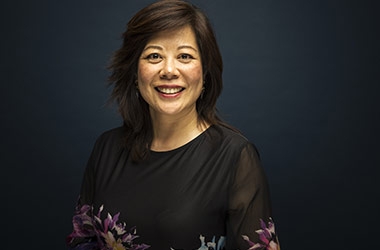Wittenborg CEO Maggie Feng Shares the Story of her Life

Feng Interview Published in Dutch Magazine ‘Elsevier Weekblad’
Wittenborg CEO Maggie Feng recently gave an interview to Dutch weekly magazine ‘Elsevier Weekblad’ (EW), where she spoke about her life and career. The full story (in Dutch) can be found here.
During the interview, Feng talked about what it was like to grow up in China during the 1970s and 1980s, a time in which the country was struggling with poverty. “I especially remember the cold winters. Our apartment building had sixteen floors and we lived on the third; hot water came down from the top of the building. Above the tenth floor the water was very warm, and fine in the middle, but by the time it reached us the water was no more than seventeen degrees. Really cold! There was no shower, and we had to fill the bath with a huge pan of boiled water,” she recalled.
The difficulties were aggravated by the fact that both of Feng’s parents – like the majority of the Chinese population at the time – worked in low-paid jobs. “The rent of the apartment building must have been next to nothing then, otherwise you just could not get by. My father made around $12 a month, my mother possibly $10 a month. And they had to take care of their own parents on such wages. Everything was rationed: rice, eggs, clothes. We did not have smart dresses or colourful clothes. Those were very different times.”
In the 1990s, Feng experienced the opening up of the country to the rest of the world – a time when international tourists started travelling to China and Chinese people would go abroad for study and work. It was during that period that she went to Beijing University of Technology, where she studied Engineering Management. “I had a good time at university. Everyone was equal, there was little competition, little hostility or trouble. We had almost nothing, and small things made us happy,” she reminisces.
Feng adds that she got her first job while studying for her degree. It was a weekend job in which she had to sell shampoo in a supermarket. “You would stand all day and try to strike up sales conversations with people; I made 35 yuan a day, about $5. I did that for two weekends, and it was unbearable. Then I discovered that companies needed someone who could arrange university students for this type of weekend work – do not tell my fellow students, because they would hate me for it! I bargained for 70 yuan per student per day, and I paid students 40 to 50 yuan, higher than the normal rate. I could easily recruit them within the university.”
A New Start
In 1999, Feng came to the Netherlands through an exchange programme offered by Saxion University of Applied Sciences in Deventer. At the time, she did not know much about the country where she would eventually settle. “I had to choose which foreign university I wanted to study at for a year, and then I saw a brochure with a tulip and a windmill on it. I thought it was beautiful, but had no idea where it was. Ultimately, my choice was determined by the picture, without much research – Google had not taken off by then. At the end of August, I arrived at the Amsterdam Airport via Helsinki, and then took the train to Deventer, to Saxion University.”
Feng’s idea was to get a second degree in ten months, and then go back to China. However, her plans were completely changed when she met her future husband, Peter Birdsall, who worked at Saxion’s international office back then. The two got married in April 2000, becoming partners not only in life, but also professionally. In 2002, Feng and Birdsall started a four-year partnership with Wittenborg’s then owners, through which the couple organised the school’s entire international division – something they had already done for Saxion. Finally, in 2008, they took over the institution.
An International School
Currently, Wittenborg’s students come from more than a hundred countries, and the institution is marked by its diversity.
Feng highlights that one of the school’s main goals is to attract international talent to the Netherlands. “We have 300,000 job vacancies right now in the Netherlands, and we need young talents to fill them. Therefore, we need to offer conditions for international graduates to stay in the country. As education providers, our task does not stop at graduation. If international graduates stay here for three, four or five years, Dutch society will reap all the benefits of the taxpayers’ investment.”
As a former international student who made it in the country, Feng says that she plans to spend the rest of her life in the Netherlands. “It really is one of the best and most beautiful countries, because this is a place where you can always keep learning and creating beautiful things, so children have a lot of perspective. Life is good here, and we sometimes forget that. Just look around, what have we to complain about?”
WUP 2/6/2022
by James Wittenborg
©WUAS Press